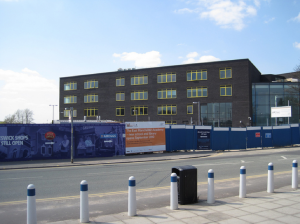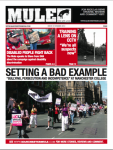What does the Academies expansion really mean?
Article published: Wednesday, September 15th 2010
 On 27 July the Academies Act 2010 came into force, beginning a radical overhaul of England’s education system. The Act allows any school to apply to become an Academy, a government-funded school able to opt out from local educational authority (LEA) control and operate independently. Education Secretary Michael Gove told the Commons that the plan “gives more freedom to teachers and injects a new level of dynamism into a programme that has been proven to raise standards for more children and the disadvantaged most of all”. But is this the complete story? Richard Goulding investigates.
On 27 July the Academies Act 2010 came into force, beginning a radical overhaul of England’s education system. The Act allows any school to apply to become an Academy, a government-funded school able to opt out from local educational authority (LEA) control and operate independently. Education Secretary Michael Gove told the Commons that the plan “gives more freedom to teachers and injects a new level of dynamism into a programme that has been proven to raise standards for more children and the disadvantaged most of all”. But is this the complete story? Richard Goulding investigates.
Limited accountability and mixed results
While the government talks of the Academies Act empowering local communities, critics have been vocal. Christine Blower of the National Union of Teachers called the expansion “an attack on the very existence of democratically accountable, free, state comprehensive education”, while six Liberal Democrat MPs rebelled against the bill, including John Leech of Manchester Withington. Twelve local MPs joined Labour’s Jon Trickett in signing an early day motion denouncing the expansion.
Much about the reforms seems undemocratic. The Act itself was rushed through Parliament using procedures normally reserved for anti-terror legislation. Governing bodies of schools do not have to consult parents or teachers before conversion, only having to take consultations with “such persons as they think appropriate.” The small print also allows consultations to be carried out “before or after the granting of an Academy order” by the Secretary of State. Proposed amendments allowing parents to vote to revert back to local control after Academy conversion were struck down.
Furthermore, Academies do not necessarily bring better results. In Manchester their record has been mixed. While the Manchester Academy in Moss Side has been rated as “outstanding”, Stockport Academy was branded “inadequate” by Ofsted in May. Most existing Academies have a sponsoring organisation able to set the curriculum and, along with two others in the local area, the schools are sponsored by the United Learning Trust, an Anglican charity. The largest of the UK’s Academy sponsors, ULT was banned from operating any more Academies last November following damning reports of some of its schools.
Equal schooling for all?
Gove fast-tracked schools rated ‘outstanding’ by Ofsted to convert as early as September and removed the requirement for them to have a sponsor. Over half of the 2000 schools registering an interest are outstanding, although only 153 are reported to have applied so far, according to government figures. This focus on advantaged schools represents a shift from New Labour, which mainly created Academies in disadvantaged areas. Schools now registering interest are wealthier than existing Academies, with three times fewer children on free school meals, according to analysis by the Centre for Economic Performance.
In Greater Manchester, 69 schools have expressed an interest. Of those, eight are in the relatively deprived Manchester area, compared to 20 schools in Trafford, ranked the third best LEA in the country in 2007. Campaigners claim the devolution of assets from locally elected councils to Academy Trusts will destroy the ability of such LEAs to provide services in the face of severe spending cuts. Chris Everitt, of the Anti-Academies Alliance, called on parents and teachers to petition schools, saying the government is “applying the Big Society to schools but what it really means is privatisation, which is less democratic.”
In Parliament, Labour MP Pat Glass hinted that some Academies use greater admissions freedoms to manipulate their intake of children with special educational needs (SEN). When asked by Conservative MP Graham Stuart if she was suggesting “that academies may block children with real SEN getting in and then falsely nominate children as having SEN afterwards” she replied “I accept that is what the data suggests.” Any school committing such an act could falsify its levels of SEN to win favour with the government and Ofsted, without undertaking the extra effort required to meet the needs of children with genuine special needs.
The government has promised to look into the issue further, but that is unlikely to comfort opponents. In 2008 a report by the Sutton Trust found that “exclusions have been quite high in some Academies, and in certain cases this has been at greater levels than in their neighbouring schools.”
Worthwhile results?
While Academies point to a GCSE success rate double that of mainstream schools, their ability to provide better teaching has been questioned. Evidence suggests greater curriculum freedom has been used to focus on vocational subjects at the expense of a wider education. According to an investigation by think-tank Civitas, less than half of the A*-C GCSE results of existing Academies are in core academic subjects, compared to 73 per cent in mainstream schools.
Everitt criticised the influence sponsors have in setting the curriculum, saying there was a “danger that private hands have an agenda that will affect pupils’ education.”
“We say you need a good local school with a broad education where you’re not discriminated against.”
Richard Goulding
This article features in the print edition of The Mule – Issue 10, out now for FREE around Greater Manchester
More: Features, Manchester
Comments
No comments found
The comments are closed.




